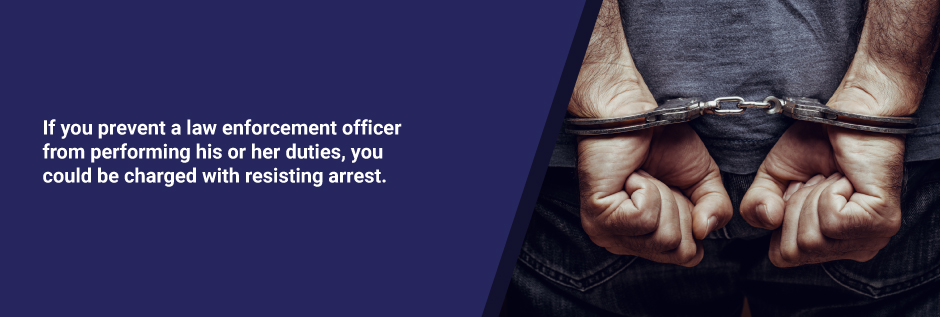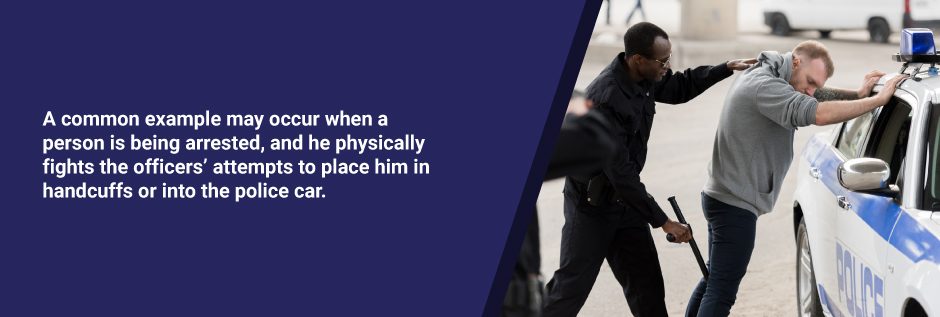If you prevent a law enforcement officer from performing his or her duties, you could be charged with resisting arrest. It sounds like a simple concept, but unfortunately, this law has been used in ways that it was never intended to charge people with crimes.

The California Legislature enacted the law against resisting arrest with a noble goal in mind: to encourage citizens to comply with orders from law enforcement officers, and to protect the wellbeing of the same officers. Over time, this law has been used as a way for some police officers to arrest citizens who are otherwise behaving lawfully.
In essence, some law enforcement officers use the resisting arrest statute to bring charges against anyone who disobeys them — even if they did not actually break the law. This abuse of power occurs throughout California. A skilled Glendale criminal defense attorney can often help to level the playing field if you have been unfairly charged with resisting arrest.
What is Resisting Arrest?

In California, a prosecutor can charge a person with the crime of resisting arrest if he or she willfully resists, delays, or otherwise obstructs a law enforcement officer or emergency medical technician (EMT) while he or she is performing or attempting to perform his or her duties. Because the law was written broadly, it can be used in a number of ways to charge a person with a crime.
According to a Glendale criminal defense attorney, a prosecutor must prove three elements in order to convict a person of the crime of resisting arrest:
- There was a public officer, peace officer or EMT lawfully performing or attempting to perform his or her duties;
- The defendant willfully resisted, obstructed, or delayed him or her in the performance or attempted performance of those duties; and
- The defendant knew or reasonably should have known that he or she was an officer or an EMT engaged in those duties.
Importantly, the prosecutor does not need to prove that the defendant intended to hurt the officer. Instead, the only “intent” that must be proven is that the defendant knowingly resisted, obstructed or delayed the public officer, peace officer or EMT.
Under California law, resisting arrest is a misdemeanor offense. Penalties include up to one year in county jail and/or a fine of up to $1,000.
How is Resisting Arrest Charged?

There are a number of ways that resisting arrest can be charged under California law. A common example may occur when a person is being arrested, and he physically fights the officers’ attempts to place him in handcuffs or into the police car. In that situation, resisting arrest may be charged based on the elements listed above — the officer was attempting to perform his duties, the person willfully resisted him as he tried to perform those duties, and the person knows that the officer was a law enforcement officer.
However, other situations are not necessarily as clear. For example, an officer pulls a car over for changing lanes without signaling a turn and tells the person to get out of the car because they are going to be arrested. The person resists, knowing that the offense is just an infraction — and not something for which she can be arrested.
Can she be charged with a crime when the order was not lawful? An experienced Glendale criminal defense attorney would argue that the charge must be dismissed because the officer was not lawfully performing his duties because he gave an illegal order.
Similarly, if the police are using excessive force in effecting an arrest, they are not acting lawfully. A skilled Glendale criminal defense attorney may be able to argue that a person was not resisting arrest if you acted in self-defense against this use of force.

Work with a Glendale Criminal Defense Attorney
The crime of resisting arrest is used more frequently by California police. While it is a misdemeanor crime, it can still have a significant impact on your life. A seasoned Glendale criminal defense attorney can investigate and analyze the facts of your case to put together a strong factual and legal defense against the charge.
The Parsanj Law Group is a boutique law firm devoted to California criminal defense. We believe in holding the prosecution to its burden of proving guilt beyond a reasonable doubt. We defend our clients aggressively, negotiating favorable plea agreements when possible, or otherwise taking cases to trial, and work hard to achieve the best possible outcome in each case. To schedule a consultation with a Glendale criminal defense attorney or learn more, contact us by phone at 818-698-6680 or by email.

